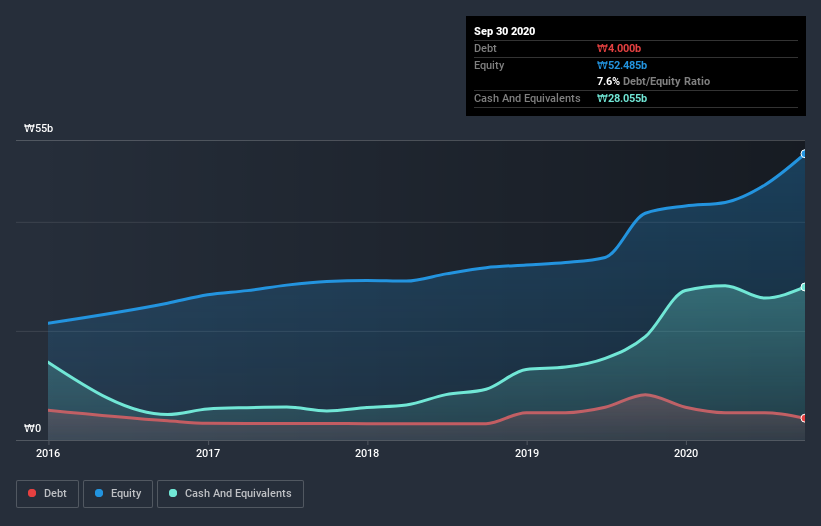
David Iben put it well when he said, 'Volatility is not a risk we care about. What we care about is avoiding the permanent loss of capital.' When we think about how risky a company is, we always like to look at its use of debt, since debt overload can lead to ruin. As with many other companies Mr. Blue Corporation (KOSDAQ:207760) makes use of debt. But should shareholders be worried about its use of debt?
When Is Debt Dangerous?
Debt and other liabilities become risky for a business when it cannot easily fulfill those obligations, either with free cash flow or by raising capital at an attractive price. In the worst case scenario, a company can go bankrupt if it cannot pay its creditors. However, a more common (but still painful) scenario is that it has to raise new equity capital at a low price, thus permanently diluting shareholders. Of course, debt can be an important tool in businesses, particularly capital heavy businesses. When we think about a company's use of debt, we first look at cash and debt together.
Check out our latest analysis for Mr. Blue
What Is Mr. Blue's Net Debt?
As you can see below, Mr. Blue had ₩4.00b of debt at September 2020, down from ₩8.30b a year prior. But on the other hand it also has ₩28.1b in cash, leading to a ₩24.1b net cash position.

How Healthy Is Mr. Blue's Balance Sheet?
The latest balance sheet data shows that Mr. Blue had liabilities of ₩17.8b due within a year, and liabilities of ₩492.3m falling due after that. On the other hand, it had cash of ₩28.1b and ₩15.1b worth of receivables due within a year. So it can boast ₩24.8b more liquid assets than total liabilities.
This surplus suggests that Mr. Blue has a conservative balance sheet, and could probably eliminate its debt without much difficulty. Simply put, the fact that Mr. Blue has more cash than debt is arguably a good indication that it can manage its debt safely.
On top of that, Mr. Blue grew its EBIT by 39% over the last twelve months, and that growth will make it easier to handle its debt. There's no doubt that we learn most about debt from the balance sheet. But it is future earnings, more than anything, that will determine Mr. Blue's ability to maintain a healthy balance sheet going forward. So if you want to see what the professionals think, you might find this free report on analyst profit forecasts to be interesting.
Finally, a company can only pay off debt with cold hard cash, not accounting profits. Mr. Blue may have net cash on the balance sheet, but it is still interesting to look at how well the business converts its earnings before interest and tax (EBIT) to free cash flow, because that will influence both its need for, and its capacity to manage debt. Over the last three years, Mr. Blue recorded free cash flow worth a fulsome 81% of its EBIT, which is stronger than we'd usually expect. That positions it well to pay down debt if desirable to do so.
Summing up
While we empathize with investors who find debt concerning, you should keep in mind that Mr. Blue has net cash of ₩24.1b, as well as more liquid assets than liabilities. The cherry on top was that in converted 81% of that EBIT to free cash flow, bringing in ₩17b. So is Mr. Blue's debt a risk? It doesn't seem so to us. Over time, share prices tend to follow earnings per share, so if you're interested in Mr. Blue, you may well want to click here to check an interactive graph of its earnings per share history.
At the end of the day, it's often better to focus on companies that are free from net debt. You can access our special list of such companies (all with a track record of profit growth). It's free.
If you’re looking to trade Mr. Blue, open an account with the lowest-cost* platform trusted by professionals, Interactive Brokers. Their clients from over 200 countries and territories trade stocks, options, futures, forex, bonds and funds worldwide from a single integrated account. Promoted
New: Manage All Your Stock Portfolios in One Place
We've created the ultimate portfolio companion for stock investors, and it's free.
• Connect an unlimited number of Portfolios and see your total in one currency
• Be alerted to new Warning Signs or Risks via email or mobile
• Track the Fair Value of your stocks
This article by Simply Wall St is general in nature. It does not constitute a recommendation to buy or sell any stock, and does not take account of your objectives, or your financial situation. We aim to bring you long-term focused analysis driven by fundamental data. Note that our analysis may not factor in the latest price-sensitive company announcements or qualitative material. Simply Wall St has no position in any stocks mentioned.
*Interactive Brokers Rated Lowest Cost Broker by StockBrokers.com Annual Online Review 2020
Have feedback on this article? Concerned about the content? Get in touch with us directly. Alternatively, email editorial-team (at) simplywallst.com.
About KOSDAQ:A207760
Mr. Blue
Operates as an entertainment company in South Korea and internationally.
Adequate balance sheet and slightly overvalued.


